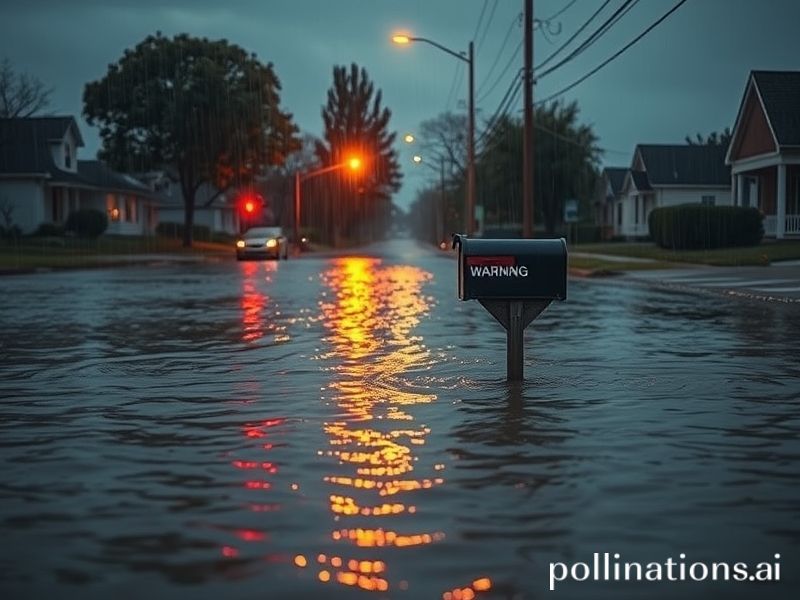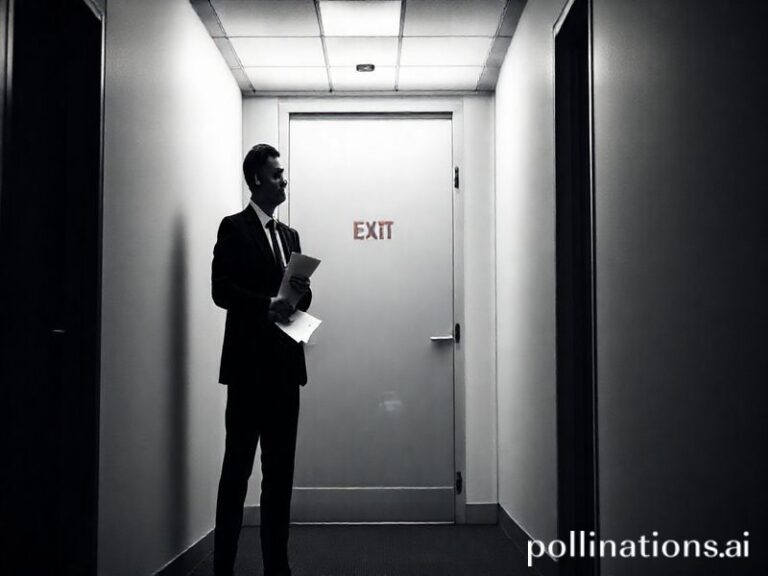flood warning
FLOOD WARNING: A WORLDWIDE INVITATION TO DON’T PANIC (TOO MUCH)
By the time you finish this sentence, somewhere between Venice and Vientiane, a municipal loudspeaker will blare the same cheery lie: “This is only a drill.” Translation: the river has broken up with its banks and is now speed-dating entire neighborhoods. From Bangladesh’s Brahmaputra to Bavaria’s beer-cellar basements, the global flood-warning system has become humanity’s most democratic lottery—every ticket wins eventual damp socks, some win complete relocation.
In the Netherlands, engineers high-five as their €3 billion “Room for the River” project does exactly what Dutch engineers have done since 1287: politely ask the sea to wait its turn. Meanwhile, across the North Sea, London’s Thames Barrier has been upgraded to withstand “once-in-a-millennium” surges—comforting, given that the last once-in-a-millennium was apparently last Thursday. Both nations share a common hobby: exporting climate-adaptation tech to countries that can’t afford the invoice, then expressing surprise when those nations politely drown anyway.
Head south to Jakarta, a city sinking faster than its president’s approval ratings. Residents check their phones for flood alerts with the same enthusiasm they reserve for spam calls: the app buzzes, the streets glisten, and everyone still drives into the same two-foot-deep lake that used to be a ring road. Indonesia’s solution? Move the capital to Borneo, a plan as subtle as changing your name after burning down the kitchen. Old Jakarta will keep sliding into the Java Sea; the flood warnings will simply be rerouted to an empty parliament building.
Cross the Pacific and California—land of drought, wildfire, and, when the mood strikes, biblical rainfall—has introduced an alert system that sends push notifications in 13 languages, none of which include “We told you not to build on that mudslide.” Residents receive texts, sirens, doorbell cams, and, for the nostalgia buffs, emergency broadcasts on AM radio. The result is a state-wide Pavlovian experiment: phone buzzes, everyone rushes to tweet #atmosphericriver while their garage slowly becomes an aquarium.
Of course, the real avant-garde in flood warnings is found where there are no warnings at all. In South Sudan, the White Nile’s seasonal indigestion swamps an area the size of Lebanon every year, and the international press collectively misplaces its car keys. The UN issues color-coded maps that resemble a toddler’s watercolor set; NGOs hold webinars titled “Innovative Finance for Floating Classrooms.” The children, meanwhile, perfect the backstroke between the latrine and the maize patch, earning extra credit in amphibious living.
Back in the industrialized world, Munich Re—the reinsurance giant that makes book on planetary misfortune—reports that global flood losses have tripled in two decades. Not to worry: premiums tripled faster. The firm’s latest glossy brochure reassures investors that “water is the new oil,” a slogan that sounds optimistic until you remember oil occasionally catches fire and becomes less ubiquitous. Analysts now price coastal condos using the same metrics once reserved for termite farms: location, square footage, and buoyancy rating.
And then there’s the meta-warning, the one no app can push: every alert trains us to treat catastrophe as a push notification to be swiped away. The siren wails, we glance up from doom-scrolling, shrug, and return to arguing online about whether sea-level rise is measured in centimeters or Marxist conspiracies. Our species has achieved the remarkable feat of turning existential hydrology into background muzak—pleasant, ignorable, and faintly reminiscent of a sinking elevator.
Conclusion (because even cynicism needs punctuation): Whether you’re Dutch, Dhakai, or Del Mar, the flood warning is the same polite cough before the deluge. The rivers are not rising out of spite; they’re simply returning property to its rightful owner. Evacuation instructions, sandbag tutorials, and climate summits all serve the same noble purpose: giving us something to do while the water remembers where it used to flow. Keep your phone charged, your humor dryer than your basement, and remember—if the alert says “this is not a test,” it’s still only half a lie. The test, dear reader, is whether we continue building arks for the few or learn to swim together. Spoiler: pack galoshes either way.







